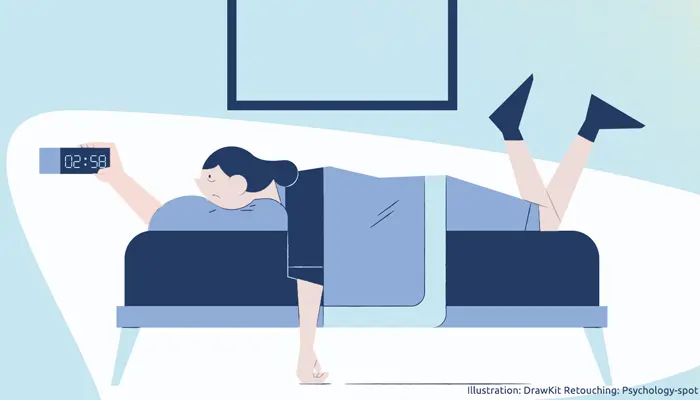
There are lucky people who put their heads on the pillow and immediately Morpheus welcomes them into his arms. The rest of us have to wait a little longer before falling asleep. In fact, insomnia is a fairly common problem.
It is likely that it happened to you, the moment when minutes begin to move slowly, you feel uncomfortable in bed, slowly increases frustration and you start thinking about all the problems you have had during the day and remember forgotten concerns.
What’s the worst thing you can do when you can’t sleep?
There are some popular remedies for sleeping, medical advices or bad habits that actually have the opposite effect and often only exacerbate insomnia. These are some of the most common:
1. Use of sleeping pills
The consumption of tranquillizers and sleeping pills is growing alarmingly. However, sleeping pills are not a good long-term option, because besides generating a dependency have also been associated with an increased risk of premature death, heart attack or stroke, for this reason many scientists say their risks go far beyond the benefits. In addition, sleeping pills only help us to fall asleep a few minutes before, so most people don’t get a significant benefit. And if that is not enough, they often generate morning weakness and a feeling of stunning.
2. Go to bed only when you are tired
Most people think that if they go to bed when they are very tired they will fall asleep right away. But going to bed one day at an hour and the next day at another, only obtain to alter their biological clock. The lack of a good sleep routine ends up with an high cost for us, because not following a stable sleep routine will make it more and more difficult to fall asleep. In fact, it has been shown that sleep routines reduce the amount of adrenaline and cortisol and increase the production of melatonin, the sleep hormone.
3. Get up when you can’t sleep
Many people think that if they can’t sleep, it is better to get up and do something different, like reading or watching television. But the time spent resting is beneficial to our bodies, even if we do not sleep. As long as there is no frustration, you can take advantage of the hours spent in bed. If we get up our body will begin producing again adrenaline and cortisol, so it will be harder to go back to sleep. In addition, if we expose to the blue light of the screens, melatonin production will be inhibited, so it will be even harder to go back to sleep.
4. Watch the hour
When you wake up in the middle of the night your first impulse is to watch what time is it. You turn around in bed, you can’t sleep and watch the clock again. This is a normal reaction, but it is not useful and will not help you relax. Watching the hour constantly will only increase the level of stress and frustration, exacerbated by your worry about falling asleep as quickly as possible. And if you want to sleep, the last thing your brain needs is to have these moments of active attention that prevent it from resting.
5. Count the sheep
It is a classic advice to reconcile sleep, but counting the sheep does not work with everyone. Many people experience anxiety and stress, especially when they see that the number grows and sleep does not arrive.
What to do when you can’t sleep? 5 techniques to fall asleep quickly
The solution is simple: everything that helps you relax is positive as it helps your brain gradually inhibit unused areas. If you can’t sleep and suffer from insomnia you need to understand a fundamental principle: everything that activates your brain and puts it to work prevents you from sleeping, while all that helps you to disconnect and relax does the opposite.
1. Visualize your favorite place
If you have a good imagination, visualizing is a very effective technique to use when you can’t sleep. The key is to imagine a scene that makes you feel relaxed, where you feel so well that your worries vanish. In fact, researchers at Oxford University have found that people who learn to use visualization and imagine relaxing scenes such as a beach or waterfall, fall asleep an average 20 minutes faster than those who count sheep.
The secret is to imagine as much details as possible so you can really feel to be there. In fact, visualization is a technique to sleep that is so powerful that involves all the senses. You can imagine being swayed calmly by the sea, being cooled by a gentle breeze … Over time, your brain will be more and more efficient in recognizing those images and associating them with pre-sleep visualizations, so it will prepare the body and the mind to rest.
2. Use the Method 4-7-8
This is a sleep technique created by Andrew Weil, a professor at Arizona University, who says that with this you can fall asleep in just a few minutes.
First you have to position the tip of the tongue behind the upper front teeth, and keep it there throughout the exercise. After close the mouth and inhale slowly gently through the nose counting mentally up to four.
So you have to hold your breath while counting up to seven, controlling the diaphragm, as in diaphragmatic breathing. Finally, release the air through your mouth as you count up to eight. The cycle is usually repeated four times. Most people do not need to do more than 10 repetitions to fall asleep.
The interesting thing about this method is that it oxygenates better the body, relaxing the parasympathetic nervous system and slowing down the heart rate, leading to a state of calm. So you can rebalance the nervous system that is probably over stimulated because of stress and worry. In addition, breathing deeply and keeping breathing increases the intra-abdominal pressure that stimulates the vague nerve, which sends signals to the brain to reduce attention.
3. Use the Progressive Relaxation
This is a very effective sleeping technique that will help relax even the muscles of the body. In addition, it is a very simple process that usually does not require more than 20 minutes.
Jacobson relaxation technique consists in contracting and then relaxing the main muscle groups of the body, starting from the feet and ending with the eyebrows. Over time you will notice that you will always fall asleep and you will not need to follow the whole procedure.
The interesting thing is that concentrating on contraction and relaxation of your muscles will help you not to worry about it.
4. Listen to relaxing music
It doesn’t work any kind of music, the ideal themes are those with a slow pace, between 60 and 80 beats per minute, because this way the music better accompanies the heart rhythm and breathing.
In fact, psychologists from Semmelweis University have found that people who listen to relaxing music before bedtime showed a significant improvement in sleep quality.
The key is that relaxing music reduces the level of norepinephrine, a stress-bound hormone, as well as reduces the level of vigilance and excitement that will allow you to fall asleep faster.
5. Let the thoughts flow
There are days when you will simply be too tired to practice sleeping techniques or it will be extremely difficult to concentrate because your concerns do not stop torturing your mind. In that case, the most effective sleep technique is to let your mind wander without trying to control it.
At first, when you lower your guard, all those ideas that bother you will assail you and you will think it’s the worst thing that can happen to you when you can’t sleep. But you have to know that when you lower your guard, your brain starts to relax, but if you try to keep these concerns constantly, you will keep it active and attentive.
If in addition to these techniques to sleep you also put lavender in the room you will fall asleep faster. Wesleyan University psychologists have found that people exposed to lavender perfume between two and ten minutes before going to bed, not only fell asleep more quickly, but slept even more profoundly and felt more energetic the next day.
It was also seen that unpleasant odors, though not very intense, can awaken or affect the quality of sleep. So, if you are a person sensitive to scents, using lavender scent will help you relax, decrease your blood pressure and fall asleep faster.
Sources:
Kripke, D. F. et. Al. (2012) Hypnotics’ association with mortality or cancer: a matched cohort study. Pharmacology and therapeutics Research; 2(1):e000850.
Harmat, L. et. Al. (2008) Music improves sleep quality in students. J Adv Nurs; 62(3): 327-335.
Goel, N. et. Al. (2005) An olfactory stimulus modifies nighttime sleep in young men and women. Chronobiol Int; 22(5): 889-904.
Harvey, A. G. & Payne, S. (2002) The management of unwanted pre-sleep thoughts in insomnia: distraction with imagery versus general distraction. Behavior Research and Therapy; 40(3): 267-277.



